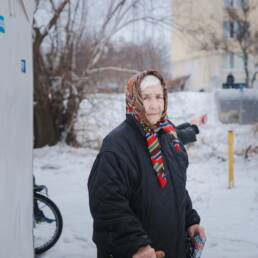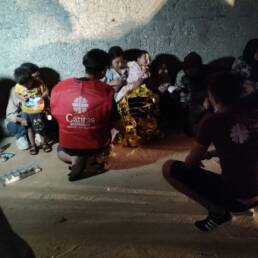Since many years, every summer we experience human tragedies in the Mediterranean sea: Human beings on small and often fragile or old vessels get in distress at sea, some of them loosing their life, others being rescued or intercepted at sea.
People end up in reception centres on the Canary Islands, at Lampedusa to name only the ones making the headlines.But the tragedy happens not only at sea and not only in summer (and not only in Europe). According to a press review end of 2007, at least 11,773 people have died since 1988 in attempts to reach EU territory1. Reception facilities are set up along the borders of the EU for those who didn’t manage to cross them or were sent back immediately, without any perspective. In some EU neighbouring countries like Libya or Morocco significant numbers of people are waiting for an opportunity to cross the sea or at least the fence. Without any support or protection they are an easy prey for smugglers or traffickers.
In December 2002 I left the house of my parents to go to Bamako by bus. From the capital I also travelled by bus during seven days, going through Mopti, Gao, Kidal and Tanzawaki until I got Kalil, a village at the border where I waited for two days before entering Algeria. There I stayed almost three years working very hard in different villages and cities (Bordj le Prieur, Reggane, Adrar, Ghardaia, Algires, Oran…) in order to save money and be able to pay the trip. Once I had enough money I went towards Morocco, I crossed the border by bus and went to Oujda. I paid € 500 for a ticket which was probably worth between € 8 to 10. I also paid another € 400 to bribe the police and pay the car which brought us to Rabat. The circumstances of the journey were very hard. In order not to be detected the trip is done during the night and on secondary routes. The trip took two nights. We were 14 people in one car: the conductor and two migrants on the front seats, 8 passengers in the rear seats and three more in the boot.
A.D., Mali
God is just, for all the gold in the world I would not sell my daughter; she’s the greatest gift God could ever give me. It’s my daughter who gave me the force to go to Nouadhibou, to board a cajuco, to cross the sea, full of danger, to risk my life to get to Europe, if God allows, in the hope to find a job enabling me to improve the living conditions of my children.
The day of my departure the idea of leaving my daughter seemed intolerable to me. But I had to for her own sake. I decided to leave during the night while she was asleep to avoid seeing her tears. My wife and I woke up on a Tuesday morning at five o’clock; I took a bath and filled a back pack with two trousers, two shirts and four t-shirts. I kissed my sleeping daughter, hugged my wife goodbye and went on the road to Nouadhibou. The trip went well, this time I knew the way; it was the third time I returned to Nouadhibou.
C.O., Gambia
More information
Leïla Bodeux
Senior Policy and Advocacy Officer
Tel: +32 (0)2 235 26 55
Mob: +32 (0)478 585 409
lbodeux@caritas.eu




